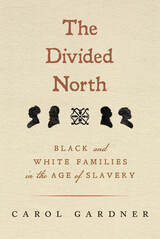6 books about Islands in literature
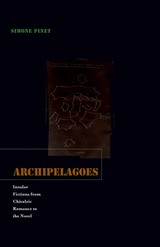
Archipelagoes
Insular Fictions from Chivalric Romance to the Novel
Simone Pinet
University of Minnesota Press, 2010
Archipelagoes examines insularity as the space for adventure in the Spanish book of chivalry, much like the space of the forest in French chivalric romance. In this innovative work, Simone Pinet explores the emergence of insularity as a privileged place for the location of adventure in Spanish literature in tandem with the cartographic genre of the isolario.
Pinet looks closely at Amadís de Gaula and the Liber insularum archipelagi as the first examples of these genres. Both isolario and chivalric romance (libros de caballerías) make of the island a flexible yet cohesive framework that becomes intrinsic to the construction of their respective genres. The popularity of these forms throughout the seventeenth century in turn bears witness to the numerous possibilities the archipelagic structure offered, ultimately taken up by the grand genres of each discipline—the atlas and the novel.
Moving from verbal descriptions to engravings and tapestry weavings, and from the chivalric politics and ethics proposed in the Amadís de Gaula to the Insula Barataria episode in Don Quixote, Pinet’s analysis of insularity and the use of the island structure reveals diverging roles for fiction, illuminating both the emergence of the novel and contemporary philosophical discussion on fiction.
[more]
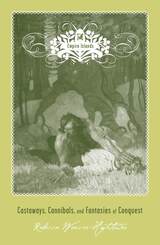
Empire Islands
Castaways, Cannibals, and Fantasies of Conquest
Rebecca Weaver-Hightower
University of Minnesota Press, 2007
Through a detailed unpacking of the castaway genre’s appeal in English literature, Empire Islands forwards our understanding of the sociopsychology of British Empire. Rebecca Weaver-Hightower argues convincingly that by helping generations of readers to make sense of—and perhaps feel better about—imperial aggression, the castaway story in effect enabled the expansion and maintenance of European empire.Empire Islands asks why so many colonial authors chose islands as the setting for their stories of imperial adventure and why so many postcolonial writers “write back” to those island castaway narratives. Drawing on insightful readings of works from Thomas More’s Utopia to Caribbean novels like George Lamming’s Water with Berries, from canonical works such as Robinson Crusoe and The Tempest to the lesser-known A Narrative of the Life and Astonishing Adventures of John Daniel by Ralph Morris, Weaver-Hightower examines themes of cannibalism, piracy, monstrosity, imperial aggression, and the concept of going native. Ending with analysis of contemporary film and the role of the United States in global neoimperialism, Weaver-Hightower exposes how island narratives continue not only to describe but to justify colonialism.Rebecca Weaver-Hightower is assistant professor of English and postcolonial studies at the University of North Dakota.
[more]
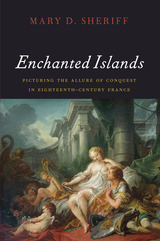
Enchanted Islands
Picturing the Allure of Conquest in Eighteenth-Century France
Mary D. Sheriff
University of Chicago Press, 2018
In Enchanted Islands, renowned art historian Mary D. Sheriff explores the legendary, fictional, and real islands that filled the French imagination during the ancien regime as they appeared in royal ballets and festivals, epic literature, paintings, engravings, book illustrations, and other objects. Some of the islands were mythical and found in the most popular literary texts of the day—islands featured prominently, for instance, in Ariosto’s Orlando furioso,Tasso’s Gerusalemme liberata, and Fénelon’s, Telemachus. Other islands—real ones, such as Tahiti and St. Domingue—the French learned about from the writings of travelers and colonists. All of them were imagined to be the home of enchantresses who used magic to conquer heroes by promising sensual and sexual pleasure. As Sheriff shows, the theme of the enchanted island was put to many uses. Kings deployed enchanted-island mythology to strengthen monarchical authority, as Louis XIV did in his famous Versailles festival Les Plaisirs de l’île enchantée. Writers such as Fénelon used it to tell morality tales that taught virtue, duty, and the need for male strength to triumph over female weakness and seduction. Yet at the same time, artists like Boucher painted enchanted islands to portray art’s purpose as the giving of pleasure. In all these ways and more, Sheriff demonstrates for the first time the centrality of enchanted islands to ancient regime culture in a book that will enchant all readers interested in the art, literature, and history of the time.
[more]
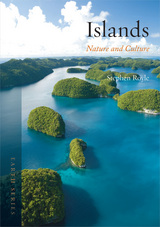
Islands
Nature and Culture
Stephen A. Royle
Reaktion Books, 2014
From Charles Darwin’s enlightening voyage to the Galapagos Islands to moat-encased prisons incarcerating the world’s deadliest prisoners, islands have been sites of immense scientific, political, and creative importance. An inspiration for artists and writers, they can be lively centers of holiday revelry or remote, mysterious spots; places of escape or of exile and imprisonment. In this cultural and scientific history of these alluring, isolated territories, Stephen A. Royle describes the great variety of islands, their economies, and the animals, plants, and people who thrive on them.
Royle shows that despite the view of some islands as earthly paradises, they are often beset by severe limitations in both resources and opportunities. Detailing the population loss many islands have faced in recent years, he considers how islanders have developed their homes into tourist destinations in order to combat economic instability. He also explores their exotic, otherworldly beauty and the ways they have provided both refuge and inspiration for artists, such as Paul Gauguin in Tahiti and George Orwell on the Scottish island of Jura. Filled with illustrations, Islands is a compelling and comprehensive survey of the geographical and cultural aspects of island life.
Royle shows that despite the view of some islands as earthly paradises, they are often beset by severe limitations in both resources and opportunities. Detailing the population loss many islands have faced in recent years, he considers how islanders have developed their homes into tourist destinations in order to combat economic instability. He also explores their exotic, otherworldly beauty and the ways they have provided both refuge and inspiration for artists, such as Paul Gauguin in Tahiti and George Orwell on the Scottish island of Jura. Filled with illustrations, Islands is a compelling and comprehensive survey of the geographical and cultural aspects of island life.
[more]
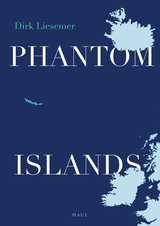
Phantom Islands
In Search of Mythical Lands
Dirk Liesemer
Haus Publishing, 2018
From the famed Atlantis to the remote Rupes Nigra, islands have long held our fascination: they are locales isolated from ordinary life, lurking in unexplored corners of the globe and thus full of undisclosed mysteries. At times, however, our fascination with islands has bled into reality, as real maps bear the coordinates of fictional lands and travelogues tell tall tales of their inhabitants, their natural wonders, or their treasures. In Phantom Islands, Dirk Liesemer tells the stories of thirty of these fantastical islands. Beginning with their supposed discovery, he recreates their fabled landscapes, the voyages that attempted to verify their existence, and, ultimately, the moment when their existence was finally disproven. Spanning oceans and centuries, these curious tales are a chronicle of human lust for discovery and wealth.
Beautifully illustrated with colored maps and charts, Phantom Islands shows the cunning of imposters and frauds, the earnestness of explorers searching for knowledge, and the pleasure that can be found in our willingness to deceive and to be deceived.
Beautifully illustrated with colored maps and charts, Phantom Islands shows the cunning of imposters and frauds, the earnestness of explorers searching for knowledge, and the pleasure that can be found in our willingness to deceive and to be deceived.
[more]

Tempest In The Caribbean
Jonathan Goldberg
University of Minnesota Press, 2003
Places sexuality at the center of Caribbean responses to Shakespeare's play.
Shakespeare's The Tempest has long been claimed by colonials and postcolonial thinkers alike as the dramatic work that most enables them to confront their entangled history, recognized as early modernity's most extensive engagement with the vexing issues of colonialism--race, dispossession, language, European displacement and occupation, disregard for native culture.
Tempest in the Caribbean reads some of the "classic" anticolonial texts--by Aimé Césaire, Roberto Fernández Retamar, George Lamming, and Frantz Fanon, for instance--through the lens of feminist and queer analysis exemplified by the theoretical essays of Sylvia Wynter and the work of Michelle Cliff. Extending the Tempest plot, Goldberg considers recent works by Caribbean authors and social theorists, among them Patricia Powell, Jamaica Kincaid, and Hilton Als. These rewritings, he suggests, and the lived conditions to which they testify, present alternatives to the masculinist and heterosexual bias of the legacy that has been derived from The Tempest.
By placing gender and sexuality at the center of the debate about the uses of Shakespeare for anticolonial purposes, Goldberg's work points to new possibilities that might be articulated through the nexus of race and sexuality.
Jonathan Goldberg is Sir William Osler Professor of English Literature at The Johns Hopkins University. His previous books include Shakespeare's Hand (2003), Desiring Women Writing (1997), Sodometries (1992), and, as editor, Reclaiming Sodom (1994) and Queering the Renaissance (1994).
[more]
READERS
Browse our collection.
PUBLISHERS
See BiblioVault's publisher services.
STUDENT SERVICES
Files for college accessibility offices.
UChicago Accessibility Resources
home | accessibility | search | about | contact us
BiblioVault ® 2001 - 2025
The University of Chicago Press





